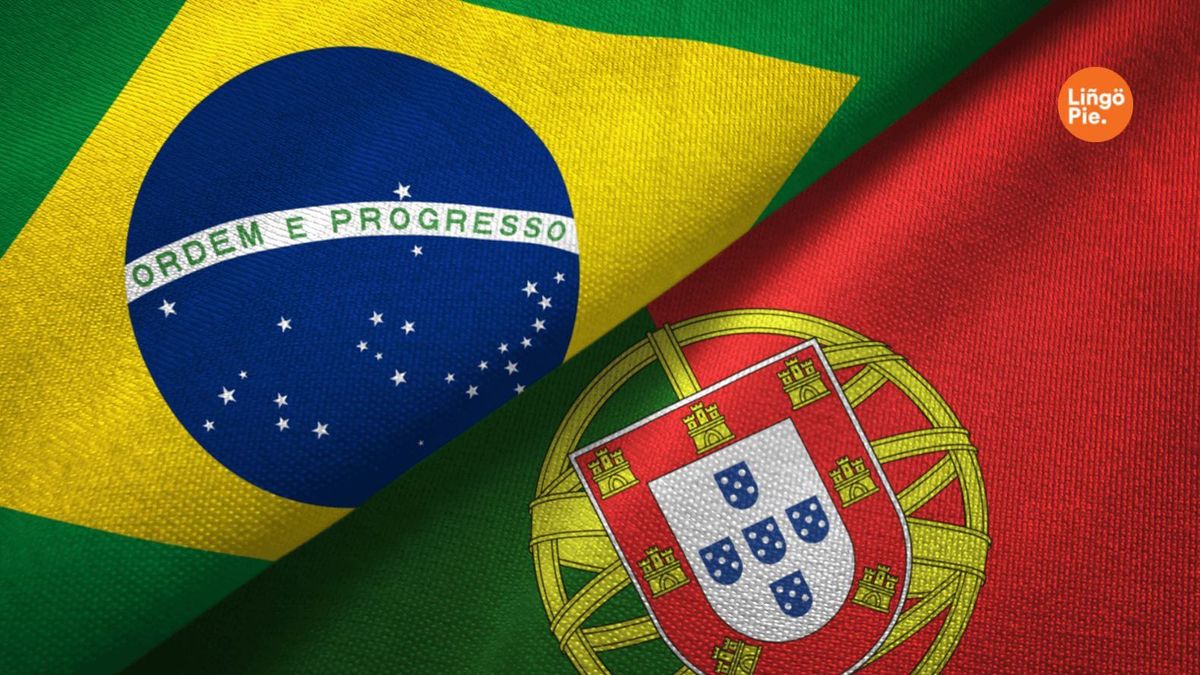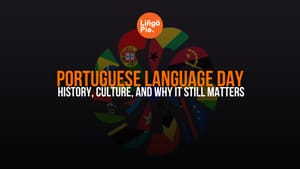What do countries as far apart as Brazil and Portugal have in common? The language!
With a population of over 211 million, Brazil is the largest Portuguese-speaking country in the world. Portugal is much smaller, with a population of just over 10 million, but it still comes in 3rd on the list of the 10 countries where Portuguese is spoken.
As with many languages that originate in one country and spread to others, there is a big difference between European Portuguese and Brazilian Portuguese.
In this article, we’re going to take a closer look at the differences between the Portuguese spoken in Brazil and the Portuguese spoken in its mother country.

Why do Brazilians Speak Portuguese?
Before we dive into the differences between European Portuguese and Brazilian Portuguese, let’s take a journey back in time to find out why Brazilians speak Portuguese in the first place.
In the year 1494, just 2 years after Christopher Columbus “discovered” the Americas, or the “New World” as it was called back then, Spain and Portugal were already racing against one another to establish colonies from North to South America.
In an effort to make peace between the countries, they both signed a treaty called the Treaty of Tordesillas, which divided the newly discovered lands between Spain and Portugal.
As part of this treaty, Spain and Portugal agreed that everything west of a line of demarcation, drawn along a meridian on a map of the Atlantic Ocean, would belong to Spain, and everything east of the line would belong to Portugal.
Frustratingly for Portugal, the only part of the American continent that this North-South line ran through was the Northeastern corner of South America — what is today Brazil.
And that, folks, is why the vast majority of Central and South American countries are Spanish speaking, while the only Portuguese-speaking country in the Americas is Brazil.
Can European Portuguese understand Brazilian Portuguese?
Perhaps the biggest difference between European Portuguese and Brazilian Portuguese is the pronunciation.
When Brazilian pronounce vowels, they sound wider and longer, whereas Portuguese people tend to not pronounce vowels so much. In fact, Portuguese people will even drop unstressed vowels between consonants in words altogether when they speak.
Another big difference in the pronunciation between Brazilian and European Portuguese is the way the letter “S” sounds at the end of a word. In Brazil, it sounds like a double “S,” but in Portugal it sounds like a “SH.”
These differences in pronunciation can make it hard for European and Brazilian Portuguese speakers to understand one another, even if they’re using the same words.
How hard it is for Portuguese people to understand Brazilians can also depend a lot on where someone is from in Brazil. It’s such a huge country that accents vary a lot.
For example, people from Rio de Janeiro and other northeastern cities pronounce the letter “S” more closely to how people from Portugal pronounce it, so it would be easier for European Portuguese speakers to understand them.
Some other key differences between European Portuguese and Brazilian Portuguese are:
● Variations in grammar and spelling
● Brazilians convert some nouns into verbs
● European Portuguese is more formal
● Completely different vocabulary for common things
○ I.e. refrigerator: geladeira (Brazil), frigorífico (Portugal)
Of course, there are plenty of words that are the same in both versions of Portuguese, too. For example, do you know how to say Portuguese in Portuguese? It’s always Português!
Should You Learn Brazilian or European Portuguese?
This is totally up to you and the decision really comes down to why you want to learn Portuguese and how you plan to use it.
For instance, if you want to travel, live, or do business in Portugal, it would be best to learn European Portuguese, and vice versa if you want to do any of those things in Brazil.
European Portuguese is also more usable in other Portuguese-speaking countries, such as those in Africa, where the Portuguese they speak is closer to that of Portugal.
On the other hand, the number of Brazilians who speak Portuguese is far higher than the combined total of people who speak the language in all the other Portuguese-speaking countries.
So, unless you’re going to be spending time in any of those other countries, you’re probably more likely to meet a Brazilian to practice speaking Portuguese with!
You may also choose which version of Portuguese to learn for cultural reasons. For instance, if you’re interested in Brazilian culture and want to watch Brazilian movies or listen to Brazilian music, it would make sense to learn Brazilian Portuguese.
Since Brazilian Portuguese is less formal and has clearer pronunciation, you may also find it easier to learn than European Portuguese.
Whatever you decide, both versions of Portuguese are beautiful languages that you can definitely put to use.
Also, the Brazilian and Portuguese language difference isn’t so big that you can’t use whatever variety you learn in both countries. You might have some confusing moments, but you’ll get by with either!
Learning Portuguese with Lingopie
If you decide to learn Portuguese, there are hundreds of hours of great Brazilian TV shows on Lingopie!
Unlike classroom instruction or using popular language learning apps, learning Portuguese by watching TV shows in their native language allows you to learn from context, instead of just memorization and drilling.
You can stream everything from news programs and travel shows to telenovelas and comedies with interactive Portuguese subtitles that you can click on to get real-time translations of words and phrases.
You can also watch shows with English subtitles or at slower speeds to make sure you’re getting everything, which is great if you’re a total beginner!
Then, when you finish watching something, review what you just learned with the handy built-in flashcards and word lists.
Sign up for a free trial of Lingopie today and get access to new Portuguese language shows every month, so you can binge-watch your way to speaking a new language!








![How To Learn Portuguese Fast? [Best 2025 Guide]](/blog/content/images/size/w300/2024/08/Lingopie-2.png)
